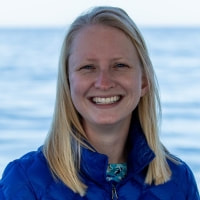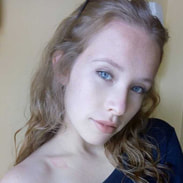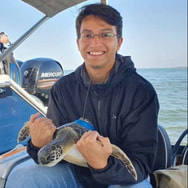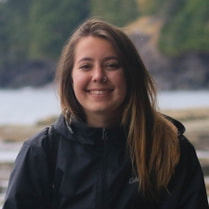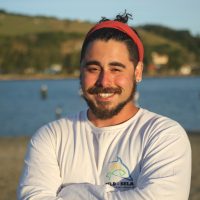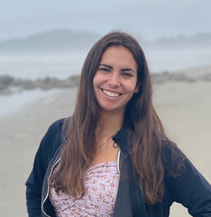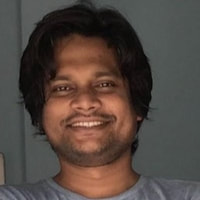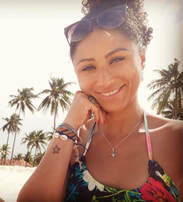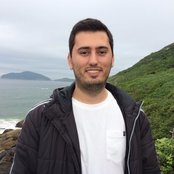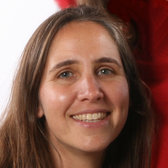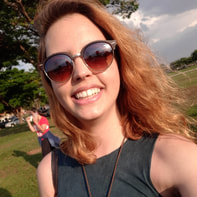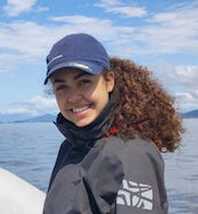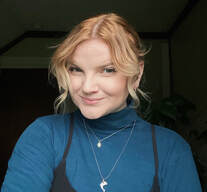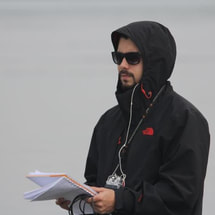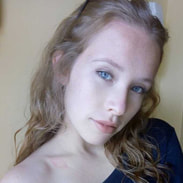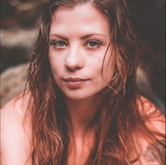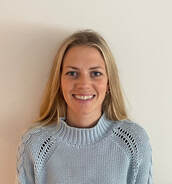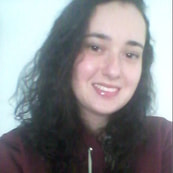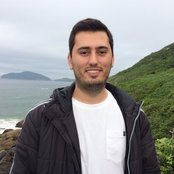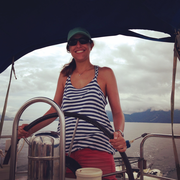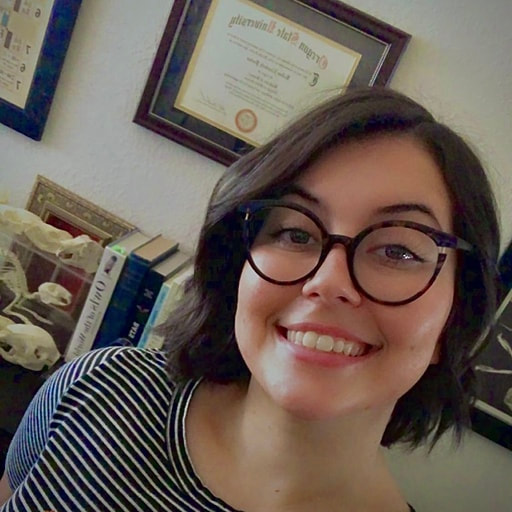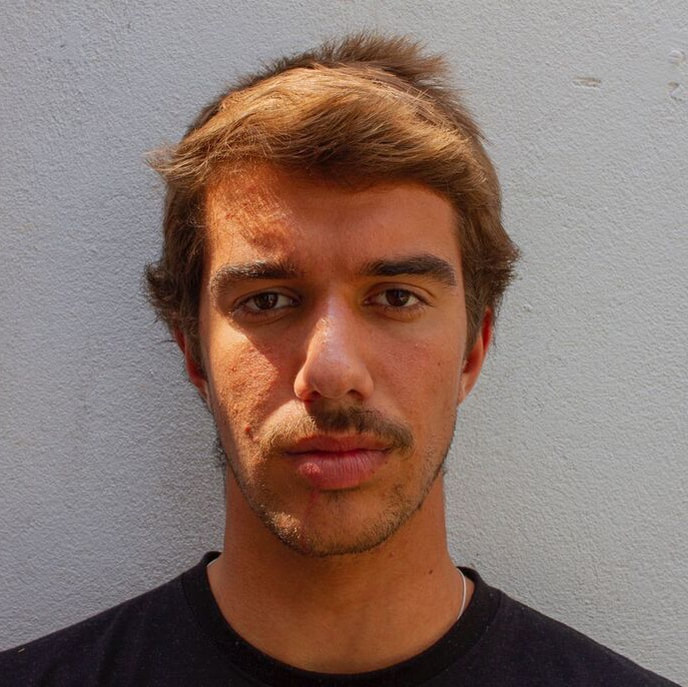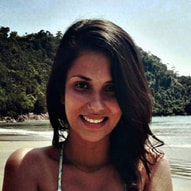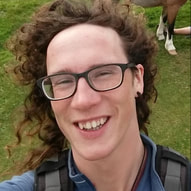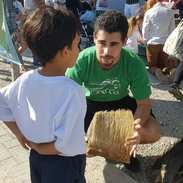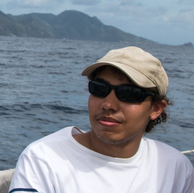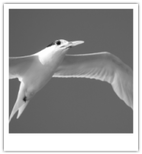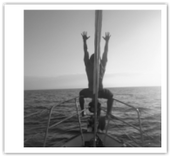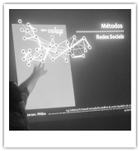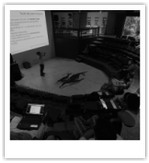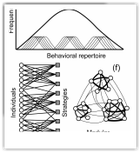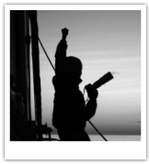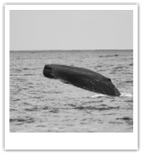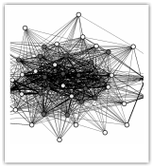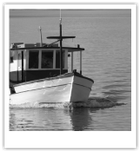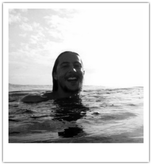Post doctoral researchers
|
Dr. Taylor Hersh, PhD
2023 - present, postdoctoral scholar Institution: Oregon State University Co-advisers: Mauricio Cantor and Kate Stafford Research: Complexity, diversity, and dynamics of bowhead whale song What is she up to? I am a bioacoustician broadly interested in the interplay among vocal complexity, social complexity, and culture in animals. Much of my past research has focused on measuring how animal communication varies over space and time, as well as developing new methods for classifying vocalizations and deducing population structure from acoustic data. With LABIRINTO, I am investigating dolphin social communication during intraspecific cooperative foraging tasks and bowhead whale song diversity in different populations. I received a PhD in Biology from Dalhousie University and did my first postdoc in the Comparative Bioacoustics Group at the Max Planck Institute for Psycholinguistics. More info: taylorhersh.weebly.com |
PhD students
|
Daiane Santana Marcondes, BSc, MSc
2022-present, PhD student at Graduate Program in Coastal and Oceanic Systems 2024: International exchange period at Oregon State University Institution: Centro de Estudos do Mar, Universidade Federal do Paraná, Brazil Supervisor: Mauricio Cantor, Co-supervisor: Dr. Camila Domit PhD thesis: Social structure and acoustic repertoire of Guiana dolphins in the Paranaguá Estuarine Complex, southern Brazil Funding: CAPES M.Sc. scholarship (Brazil) What is she up to? Daiane investigates the relationship between acoustic behavior and social structure of Guiana dolphins, and how the exposure to anthropogenic activities can disrupt both social and acoustic repertoires. |
|
Gabriel Fraga da Fonseca, BSc, MSc
2022-present, PhD student at Graduate Program in Coastal and Oceanic Systems 2024: International exchange period at Oregon State University Institution: Centro de Estudos do Mar, Universidade Federal do Paraná, Brazil Supervisor: Dr. Camila Domit, Co-supervisors: Prof. Maikon di Domenico, Dr. Mauricio Cantor PhD thesis: Spatiotemporal patterns of sea turtle mortality in the Southern Atlantic Funding: CAPES M.Sc. scholarship (Brazil) What is he up to? Gabriel investigates the spatio-temporal distribution of sea turtle stranding events in southeastern and southern Brazil, by applying a range of modelling techniques to a comprehensive database. |
|
Michaela Kratofil, BSc, MSc
2023-present, PhD student in Wildlife Sciences Institution: Oregon State University, USA Supervisor: Dr. Mauricio Cantor PhD thesis: Movement ecology of Hawaiian false killer whales: Influence of the physical environment and social structure, with implications for management Funding: NSF GRF What is she up to? I am a NSF GRFP Fellow at Oregon State University’s Marine Mammal Institute. Leading up to graduate school, I worked as a research assistant at Cascadia Research Collective, a non-profit organization conducting research on marine mammal populations off the US West Coast and Hawaiian Islands, and continue to collaborate with CRC on my thesis research. I’m broadly interested in applied ecological research and conservation, but have a particular interest in the population and movement ecology of marine mammals. Through my current and future research, I aim to use quantitative techniques to better understand how both the physical and social environments shape animal movement, and what implications these have towards management objectives. My work to date has primarily consisted of analyzing telemetry data for research initiatives on Hawaiian odontocetes, although I’m involved in a number of different studies concerning odontocete stock structure and management in Hawai‘i. Thus far my research has entertained a variety of conservation themes, including ecotoxicology, fisheries bycatch, mid-frequency sonar exposure-response, and species-habitat modeling. |
|
João Valle Pereira, BSc, MSc
2024-present, PhD student in Wildlife Sciences Institution: Oregon State University Supervisor: Mauricio Cantor PhD thesis: Behavioral mechanisms, population consequences, and ecological resilience of dolphin specialized foraging behavior What is he up to? I am a biologist and have a Master’s degree in Ecology (2021) from the Universidade Federal de Santa Catarina, Brazil. My main areas of expertise and research are behavioral ecology, social structure, and cetaceans and artisanal fishers behavior. My PhD work will combine archival and new empirical data to address the behavioral mechanisms of specialized foraging tactics of bottlenose dolphins in Florida Bay and estimate their consequences for population dynamics. I will also develop agent-based models to infer the resilience of the dolphins’ foraging tactics to sea level rise and climate change. More info: Twitter, ResearchGate |
MSc students
|
Kyra Bankhead, BSc
2022-2024, MSc student in Wildlife Sciences Institution: Oregon State University, USA Supervisor: Dr. Mauricio Cantor Supervisory committee: Dr. Mark Novak, Dr. Doug Reese, Dr. Katie McHugh, Collaborators: Dr. Randall Wells, Dr. Sonja Wild MSc dissertation: The diffusion dynamics of human-induced food provisioning on Sarasota dolphins What is she up to? I received my Bachelor's degree with a marine emphasis at Western Washington University, where I worked in Dr. Acevedo-Gutierrez’s Marine Mammal Ecology lab. In the MMEL, I developed a research project that monitored the responses of two Washington coast harbor seal populations to anthropogenic noise disturbance. I developed an immense interest in marine mammal behavioral ecology, and started researching cultural transmission in cetaceans where I came across many of Dr. Cantor’s papers. Thereafter, I obtained my current position in Dr. Cantor’s Lab for Animal Behavioral Interaction Research in the Ocean, and am currently investigating the spreading dynamics of human-induced food provisioning on Sarasota dolphins. The major goal of my study is to identify the mechanism by which key individual dolphins spread the begging behavior in Sarasota to help stop the conditioning of dolphins to direct and indirect provisioning by humans. Apart from the lab, I spend my time outside, specifically at the beach swimming and diving! |
|
Mahmud Rahman, BSc, MSc
2023-2025, MSc student in Wildlife Sciences Institution: Oregon State University, USA Supervisor: Dr. Mauricio Cantor Collaborators: Dr. Jennifer Lewis MSc dissertation: Risk-taking behavior among bottlenose dolphins: individual variation and social influence What is he up to? Mahmud is an international M.Sc. student, coming from a riverine country Bangladesh where the largest population of Ganges River dolphins live. He has a bachelor degree in Fisheries and became interested in dolphins while working with Wildlife Conservation Society. His primary job was building a citizen science fishermen network to collect data on by-catch of cetaceans (e.g., Ganges River dolphins, Irrawaddy dolphins, Humpback dolphins). Being passionate about electronics, programming, and behavioral ecology, he realized that advanced technology can be used to research mapping behavioral networks. This excites him the most and has pushed him to pursue an M.Sc. in the Labirinto lab. His research will be investigating risk taking dolphins in a residential bottlenose population in the Florida Keys and their influence on other dolphins. |
Alumni
PhD students
|
Dr. Stephane P.G. de Moura, MSc, PhD
2019-2024, PhD Graduate Programme in Coastal and Oceanic Systems Institution: Universidade Federal do Paraná, UFPR, Brazil Supervisor: Dr. Camila Domit, Co-supervisor: Dr. Mauricio Cantor PhD thesis: Distribution and spatial dynamics of Guiana dolphins, Sotalia guianensis, and the potential vulnerability to impacts on the Paraná coast, southern Brazil. What was she up to? Stephane began her academic carrer working with sea turtles, latter she began her studies with cetaceans. For the PhD thesis, she is studying the distribution and the spatial dynamics of Guiana dolphins in Paraná Coast, and also how the individual variation in space use influence their vulnerability to anthropic impacts. In parallel, Stephane is a collaborating researcher at the NGO MarBrasil. She works studying the biology and ecology of Green turtles in the Paraná coast. Her main interests are in population and behavioral ecology. Stephane is a spiritualist person and she believes that she is here to investigate the mysteries of life. She has always loved the ocean and working with it is a personal accomplishment. |
|
Dr. Alexandre M. S. Machado, BSc, MSc, PhD
2019-2024, PhD at the Graduate Programme in Ecology Institution: Universidade Federal de Santa Catarina, UFSC, Brazil Supervisor: Prof. Fabio Daura-Jorge, Co-supervisor: Mauricio Cantor PhD thesis: The role of environment and individual differences on dolphin-fisher mutualism What was he up to? Alexandre studied how the individual variation in dolphins that forage with artisanal fishermen influence the population dynamics in Laguna. He wass interested in a) describing the fine-scale spatial dynamics of foraging dolphins collecting multiple data types simultaneously; b) testing whether there are any dominance hierarchy among dolphins during the interactions with fishermen; c) quantifying the influence of individual variation to the foraging success of fishermen; and d) evaluating the population-level implications of such variation to the dolphins. More info: Alexandre's personal page, Twitter, ResearchGate |
|
Dr. Shanan Atkins, BSc, MSc, PhD
2018-2023, PhD at the School of Animal, Plant and Environmental Sciences Institution: University of the Witwatersrand, Johannesburg, South Africa Supervisor: Prof. Dr. Neville Pillay, Co-supervisor: Mauricio Cantor PhD thesis: Identifying leverage points to solve the human-wildlife conflict regarding shark nets What was she up to? Shanan is wild about biodiversity in all its amazing manifestations and is driven to use science to inform effective conservation action to prevent the loss of biodiversity. Sharks and other marine animals are systematically killed in shark nets in KwaZulu-Natal, South Africa, that have been set to reduce the risk of shark attack. They are culled to ensure human well-being and safeguard tourism and this is controversial but difficult to change. We’re using a human-wildlife conflict framework to investigate the issue - mapping the conflict to identify leverage points and searching for innovative solutions to manage it. We aim to examine the needs, perceptions and attitudes of the decision-makers and the general public, and to find answers to questions such as ‘what non-lethal alternatives exist that could be useful?’ and ‘how do endangered humpback dolphins behave at a particularly risky beach?’ |
MSc students
|
Tainá de Souza Duarte Nogueira, BSc
2020-2024, MSc student at Graduate Program in Ecology Institution: Universidade Federal da Bahia, Brazil Supervisor: Prof. Dr. Marcos Rossi-Santos, Co-supervisor: Mauricio Cantor MSc dissertation: Spatial ecology and conservation status of Guiana dolphin in the Todos os Santos Bay, northeastern Brazil What is she up to? During her master's Tainá investigated the spatial dynamics of the Guiana dolphin population (Sotalia guianensis) that inhabits the Bay of Todos os Santos in Bahia, Brazil, using social proximity data and individual photo identification. She compared aspects of the social organization, such as group composition and size, across populations, relating social patterns with environmental descriptors and resources availability along the distribution of the species. |
|
Fernanda Fecci, BSc, MSc
2021-2024, MSc student at the Graduate Programme in Coastal and Oceanic Systems Institution: Universidade Federal do Paraná, UFPR, Brazil Supervisor: Dr. Camila Domit, Co-supervisor: Dr. Mauricio Cantor MSc dissertation: Anthropogenic disturbance on parental care of Guiana dolphins What was she up to? Fernanda combined behavioural sampling with drone imaging analyses to investigate the influence of anthropogenic activities on the parental care of Guiana dolphins at the Paranaguá Estuarine Complex, southern Brazil |
|
Kiera McGarvey Sears, BSc, MSc
2022, MSc student at University College Cork, Ireland Institution: Oregon State University, USA Co-Supervisors: Mauricio Cantor, Prof. Emer Rogan, Prof. Fabio Daura-Jorge MSc dissertation: Parallel Lives: Do bottlenose dolphins cooperate amongst themselves when foraging with artisanal net-casting fishers? What is she up to? Kiera studied the fine-scale foraging coordination among bottlenose dolphins that interact with artisanal net-casting fishers in Laguna, southern Brazil, to investigate whether this foraging tactic represents a case of social predation for the dolphins. Kiera quantified the degree to which groups of dolphins coordinate their actions during their interactions with the artisanal fishers, by measuring the cohesion, heading, and breathing synchrony of dolphin groups of different sizes in aerial drone footage of the interaction. Kiera was a visiting MSc student from the University College Cork, carrying out her thesis at the Marine Mammal Institute, Oregon State University. |
|
João V.S. Valle Pereira, BSc, MSc
2019-2021, MSc student at Graduate Programme in Ecology, Institution: Universidade Federal de Santa Catarina, Brazil Supervisor: Prof. Fabio Daura-Jorge, Co-supervisor: Mauricio Cantor MSc dissertation: Individual behavioural variation among artisanal fishermen may affect the foraging cooperation with wild dolphins What is he up to? João carried out his Masters thesis on the individual behavioural variation among artisanal fishermen in Laguna who interact with wild dolphins. He empirically described the dynamic fishing system by artisanal fishermen using state-of-the-art field methods, with drones and GPS tracking With data on the fine-scale spatial variation during the cooperative fishing, he investigated fishing performance and social reputation among fishermen More info: Twitter, ResearchGate |
|
Daiane Santana Marcondes, BSc, MSc
2019-2021, MSc student at Graduate Program in Coastal and Oceanic Systems Institution: Centro de Estudos do Mar, Universidade Federal do Paraná, Brazil Supervisor: Mauricio Cantor, Co-supervisor: Dr. Camila Domit MSc dissertation: Acoustic behaviour of Guiana dolphin Sotalia guianensis at port and conservation areas Funding: CAPES M.Sc. scholarship (Brazil) What is she up to? Daiane always loved and cared about the ocean, their balance and biodiversity. Now she will carry out her Masters thesis on the comparison of Guiana dolphin acoustic behaviour at port and conservation areas of Complexo Estuarino de Paranaguá. Her main goal is understand and clarify the influence of anthropic underwater noises on the communication and behaviour of these animals, in order to contribute to the strengthening of public policies and creation of mitigating measures for the impact on cetaceans and their environment. She also have a lot of interest and some experience in molecular genetics, cytogenetics and phylogenetic analyses. |
|
Bruna Santos da Silva, BSc, MSc
2019-2021, MSc student at Graduate Programme in Ecology, Institution: Universidade Federal de Santa Catarina, Brazil Supervisor: Mauricio Cantor, Co-Supervisor: Prof. Prof. Natalia Hanazaki MSc dissertation: Changes in the socioecological system of artisanal fishery with wild dolphins and the role of cooperative interactions among fishers What is she up to? Bruna has done her Masters thesis on the social structure of the artisanal fishermen who have been fishing with wild dolphins in Laguna for decades. Her main goal was to map the network of affiliative associations among individual fishermen and evaluate the influence of some drivers in shaping their social structure, such as kinship, similarity in fishing area, age classes, fishing experience and economical dependence on this type fishery. |
|
Penny Tarling, BSc, MSc
2020-2021, MSc student, Data Sciences Institution: University of Barcelona, Spain Supervisor: Prof. Dr. Sergio Escalera, Co-supervisor: Mauricio Cantor, Albert Clapés MSc dissertation: Deep learning to count fish in sonar images What is she up to? Penny has carried out her MSc research on Data Science by developing a new machine learning model to detect mullet fish in low-resolution sonar imaging. The outcomes of her research were then applied to empirical data collected during the interaction between dolphins and fishers in southern Brazil to generate a temporal series of mullet detections that can elucidate the drivers of the dolphin-fisher cooperation. |
|
Estela Dibo Soares, BSc, MSc
2018-2020, MSc student at Graduate Program in Coastal and Oceanic Systems Institution: Centro de Estudos do Mar, Universidade Federal do Paraná, Brazil Co-Supervisor: Dr. Camila Domit; Co-Supervisor: Mauricio Cantor Master's dissertation: Skin diseases in Guiana dolphin at port and conservation areas: short-term responses to anthropogenic disturbance Funding: CAPES M.Sc. scholarship (Brazil) What is she up to? Estela always liked the ocean and the animals that are living in that environment and she is interested in work with marine mammals, researching mainly behavior and ecology, in order to understand more about these animals and the environment where they live, analyzing the anthropic impacts for contribute to the preservation of these individuals and through this information contribute for the research too. Through her master degree in Centro de Estudos do Mar of UFPR, with the professor Camila Domit and the co-supervisor Mauricio Cantor, she had the opportunity that she always dreamed. |
|
Alexandre Marcel da Silva Machado, MSc
2016-2018, MSc student at the Graduate Programme in Ecology Institution: Universidade Federal de Santa Catarina, UFSC, Brazil Supervisor: Prof. Fabio Daura-Jorge, Co-supervisor: Mauricio Cantor Master's thesis: Individual traits affect the society of bottlenose dolphins that forages cooperatively with artisanal fishermen Funding: CAPES M.Sc. scholarship (Brazil) and small grants by the Society for Marine Mammalogy (USA) and the Animal Behaviour Society (USA). Congrats on getting these! What is he up to? Alê has just earned his Master's degree in Ecology studying the bottlenose dolphin population of dolphins that forage with artisanal fishermen. Laguna’s bottlenose dolphin population is structured into distinct social modules of dolphins that interact or not wth fishermen. His main goal was to tease apart the contributions of biological, ecological and behavioral traits of the individuals in shaping the society into these modules, which can lend support for the hypothesis that social learning of this cooperative foraging tactic may be the primary mechanism underpinning this modular social structure. More info: Twitter, ResearchGate |
|
Luiza Beirão-Campos, MSc
2013-2015, MSc student at the Graduate Programme in Ecology Institution: Universidade Federal de Santa Catarina, UFSC, Brazil Supervisor: Prof. Paulo C. Simões-Lopes, Co-supervisor: Mauricio Cantor Master's dissertation: Do space use influence social relationships of Guiana dolphins? Funding: CAPES M.Sc. scholarship (Brazil) Publications:
More info: ResearchGate |
Late sensu graduate students
|
Kellan Parker
2023, graduate certificate in wildlife Management Institution: Oregon State University Supervisor: Mauricio Cantor Project: Social Dynamics and Agonistic Behavior in California Sea Lions in Nonbreeding Colonies What is she up to? I hold a Bachelor’s degree in Fisheries & Wildlife Sciences with a specialization in conservation biology, as well as a graduate certificate in Wildlife Management from Oregon State University. During my academic tenure, I worked as a research fellow in the Undergraduate Research in the Sciences and Arts (URSA) program under the guidance of Dr. Sanchez. My research focused barn owl behavior and nest box adoption success. Throughout my academic journey, I nurtured a profound interest in conservation behavior, with primary focuses on behavioral ecology, conservation biology, and wildlife management. Presently, I am a research analyst for Dr. Eleanor Gaines at the Institute for Natural Resources (INR), where I conduct in-depth species analyses on native reptiles and amphibians in Oregon. Additionally, I work as a writing technician for Dr. Todd Wilson affiliated with the United States Forestry Service (USFS), researching Humboldt’s flying squirrels as crucial indicators of long-term forest health. Beyond my professional commitments, I spend most of my time outside taking wildlife photographs or create insightful science-related content for social media. You can find more information about my science communication activities on my website, https://kellaneparker.squarespace.com |
Honors students
|
Bernardo Jacob
2020-2022, BSc student, Biological Sciences Institution: Universidade Federal de Santa Catarina, UFSC, Brazil Supervisors: Mauricio Cantor MSc dissertation: Occurrence and behavior of scaled chachalacas (Ortalis squamata) in urban rainforest fragments of the Santa Catarina Island What is he up to? Bernardo concluded his BSc research project on the spatial occurrence and behavior of the chachalaca (Ortalis squamata) in the Santa Catarina Island, southern Brazil. He used visual surveys to investigate how different group sizes of chachalacas are distributed across forest fragments that differ in proximity to human residences. |
|
Bianca Perez
2018, Undergraduate research training in Biological Sciences Institution: BSc in Biological Sciences, Universidade Estadual de Campinas, Brazil Supervisor: Mauricio Cantor What is she up to? Bianca has great interest in the area of sociobiology of cetaceans, as well as dedicating herself to education and environmental conservation. Starting her career in this area, she carried out her undergraduate research training with a project analyzing aspects of the cooperative behaviour of the Bottlenose dolphin population with artesanal fishermen in Laguna, then has complete an internship in a non-for-profit organization focused on the biology and conservation of the southern right whales. She is currently carrying out her honour's project on the behavioural budget of female right whales and their calves during the breeding season in Brazil. |
|
Jack Peter Ford
2017-2018, Undergraduate research training Institution: BSc in Zoology, Cardiff University, Wales, UK Supervisor: Mauricio Cantor, Mentor: Prof. Frank Hailer Dissertation: Do dolphins that forage with net-casting fishermen use signature whistles? Funding: Cardiff University, UK What is he up to? Jack is very interested in social systems, communication and learning in cetaceans and like to investigate the debate of cetacean culture. In Wales, he has spent a lot of time studying harbour porpoises as well as monitoring populations of bottlenose and common dolphins through photo-identification and ferry transects. Jack is spending his Professional Training Year (PTY) at Universidade Federal de Santa Catarina (Florianopolis, Brazil) to experience the exciting project on the Bottlenose dolphins that cooperatively forage with artesanal fishermen in Laguna. |
|
João Victor Silva do Valle Pereira, BSc
2017-2018, Honours student in Biological Sciences Institution: Universidade Federal de Santa Catarina, UFSC, Brazil Honours thesis: Influence of behavioural context on the social structure of dolphins that forage with artisanal fishermen Funding: PIBIC-UFSC Honours scholarship from CNPq (Brazil) Congrats on having the project selected! What is he up to? João has just completed his honours thesis studying the bottlenose dolphins in Laguna. His goal was to estimate how much the frequency of engaging in the cooperative foraging behaviour with artisanal fishermen drives the association patterns among dolphins. He also used tools from network theory to explore how the behavioural context affects the social structure of the dolphins. |
Undergraduate research training students
|
Emilie Ehrhardt
2019, BSc (Hons) Animal Behaviour and Welfare Institution: Plymouth University, UK Supervisor (Honours and placement year): Prof. Simon Ingram, Plymouth University. Co-supervisors (placement year): Mauricio Cantor, Prof. Fabio Daura-Jorge, Universidade Federal de Santa Catarina What is she up to? Emilie is passionately curious about the natural world and wildlife. Her interests have led her to work with many different types of animals and areas of work, including raising a litter of wolves in an animal park in Norway—which only made her more certain of her fascination with animals and the wish to study their behaviour. Most recently, Emilie returned home to Denmark from the Maldives, where she spent three months working with an NGO charity that studies whale sharks. Animal behaviour and conservation efforts are her big focus areas, but taking it a step further to inspire and educate people about the natural worlds and wonders through media, such as documentaries and photos, are what really gets her excited. Currently, Emilie is studying what seems to be a dream degree (which isn’t available in Denmark, so she had to go abroad to study it), the BSc (Hons) Animal Behaviour and Welfare bachelor at Plymouth University, UK. As part of her Placement year, Emilie joined the Aquatic Mammals Lab at the Universidade Federal de Santa Catarina (Brazil) where she can have hands-on experience in researching dolphin behaviour. She will participate in the field and lab activities of two research projects in southern Brazil: the cooperative foraging between bottlenose dolphins and artisanal fishermen in Laguna; and the behaviour responses of Guiana dolphins to perceived predators in Norte Bay, Florianópolis. |
|
Jessica Sueli dos Santos Batista
2018, Mentored undergraduate student Institution: Universidade Federal de Santa Catarina, Brazil Mentor: Mauricio Cantor What is she up to? Jessica concluded a 5-month internship at the University Hospital during 2018 |
Lab research volunteers
|
Wilfried Beslin, MSc
2013, volunteer research assistant during the project "Galápagos sperm whales" Institution: Dalhousie University, Canada Activities: Wilfried was one of the brave and hard working volunteers who helped me identify thousands of sperm whale codas from our expeditions off the Galápagos Islands in 2013 and 2014. We spent several hours listening to the whales and marking their social sounds, which later on were found to be from different vocal clans than we expected in the area. What is he up to? Wilfried earned his Master's degree on bioacoustics of sperm whales, in which he is developing his own programs to automatically count and measure sperm whales from their echolocation clicks. Wilfried works under the supervision of Dr. Hal Whitehead at Dalhousie University, and in collaboration with Dr. Shane Gero who leads the Dominica Sperm Whale Project. |
|
Josh Madin, Elizabeth Hurley, Madison Evans, Hujo Arriojas
2014-2016, Mentored undergraduate students on the research project of Sperm whales off the Galápagos Institution: Dalhousie University, Canada |
Mentored high school students
|
Brooke Santiago, High school student
2016-2017, Mentored high school student Research project: Characterizing Sequences of Codas Produced by Sperm Whales from Different Clans Institution: East Hampton High School, New York, US What is she up to? Brooke is a very keen high school student who has helping us to analyze coda production by sperm whales off Galápagos during our 2013-14 expeditions. My colleague Ana Eguiguren and I have been mentoring her while she carries out her own research projects on sperm whale bioacoustics. |
|
Brooke Santiago, High school student
2015-2016, Mentored high school student Research project: Correlating different sized sperm whale groups to their amount of coda production Institution: East Hampton High School, New York, US What is she up to? Brooke is a very keen high school student who has helping us to analyze coda production by sperm whales. Recently, her project won a High Honours Award at the Long Island Science Congress competition! |
Home
|
Academic Record
|
Publications
|
Professional
|
Projects
|
